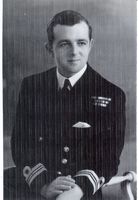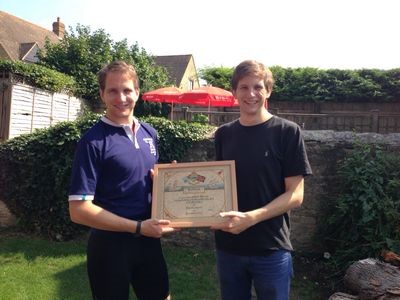"On Nov 27 about 10.30 during the forenoon watch, action stations was sounded off. Shortly afterwards the Commander announced over the loudspeaker that "The Italian battle fleet is at sea, sixty miles distant". Even as he was speaking the ship sped forward, more fuel applied, and a good thirty knots were soon obtained. The chase was on.
Ships from all directions began to join us and very soon our force numbered over fifteen ships, including the Renown and Ramiles, four ships of our class, (Manchester, Newcastle, Sheffield and Southampton) and the remainder consisted of several older type cruisers and destroyers. We were gradually closing on the enemy and the four ships of our class representing the 18th Cruiser Squadron soon began to show their superior turn of speed by forging well ahead to take the lead. About 11.30 we sighted several trails of smoke on the horizon. It was the smoke of the enemies' ships, no doubt trying to manoeuvre into some kind of battle formation which would provide a very hasty means of retreat.
The first salvo was fired by the Italians and it splashed harmlessly between the "Sheffield" and us. The next second there was a blinding flash, a roar like thunder and a blast which nearly blew us 4" guns crews off our feet as our after 6" turrets had their say in the argument.
That was the start of a ding-dong exchange of ideas, the ideas being in the form of 6" and 8" shells, hurtling through the air with their message of death and destruction for whoever they should land on. The sea all around us and between other ships was marked by columns of water sent up by the enemies' salvoes just missing their targets, thanks to the skill of the British skippers in changing course at the precise and exact moments. We could also observe our shots falling with good effect amongst the smoke that marked the Italian ships positions, coupled with this was the intermittent flashes of the enemies' guns as they tried to make their many straddles they got on us into hits on us. They only succeeded in doing this once during the whole two hours or so of the action. That was when the cruiser "Berwick" was hit; a shell hit the after turret and caused the only casualties and damage that our ships sustained. She was able to maintain a good speed and carry on firing with her remaining guns, in spite of the damage aft.
During all this time our 6"guns crews were working stripped to the waist, loading ammunition hoists, unloading them in the gun-house and ramming the shells home and inserting the cordite at top speed. Eventually, the breeches got so hot, the cordite charge was exploding on its own without waiting to be fired in the proper manner. This made it extremely dangerous for the guns crews and it didn't allow the loading numbers much time to jump clear of the recoil. But still we kept on firing, and so the enemy still replied. His reply however did not carry the same weight it did at the start, for the reports that came through our phones stated, one destroyer sunk, two cruisers out of action, and one battleship on fire astern. The range finders also reported the enemy cruisers and destroyers to be retreating at something like 40 knots. They had apparently had enough, and were now seeking the safety of their minefields, where, because of the special job us and the "Southampton" were on, we could not go and nose them out.
So ended a most interesting and exciting two hours; two hours in which I was only a spectator, but ready to go into action with the 4" in a split seconds notice should the enemy at any time have come within our range. As they did not, the 6" chaps did all the work. Also our four turrets altogether fired well over a thousand rounds, and when we ceased firing they were just about ready to drop everything and go out for a breath of fresh air. Even then it was only to take some ammunition from the after turrets to the forward turrets to equalise the remaining ammunition out.
We still remained at action stations and went to dinner in relays. The days fun was not yet over though for later on some of Musso's bombers came and had another unsuccessful try at bombing the Ark Royal, which was steaming just off our port quarter, a terrific barrage was put up by her, us, and other ships around us. The bombs, all falling in the sea, made a pretty picture as they sent up huge columns of water which remained in the air for several seconds before gradually vanishing, leaving the surface of the sea just as it was a few minutes before.
At one time, a stick of bombs were dropped right alongside her and she was completely obliterated from our view by the wall of water that was thrown up. She must have surely been hit that time we thought, but that was not the case, she just came steaming into view again as safe and sound as ever.
The hail of A. A. shells that was by now going up all round the raiders and the sight of the Ark Royals own planes taking off was enough to persuade the Italian airmen not to stick around any longer, so they set a course for home at top speed."




